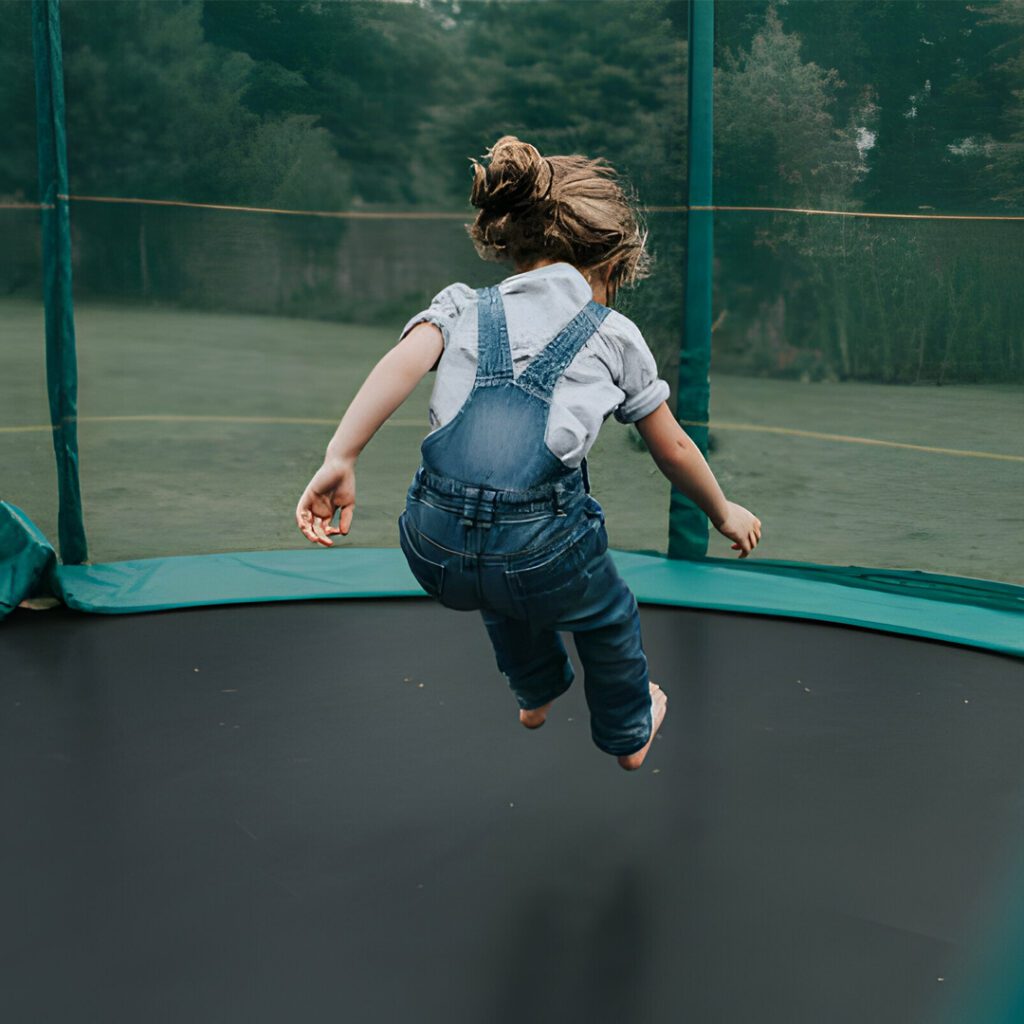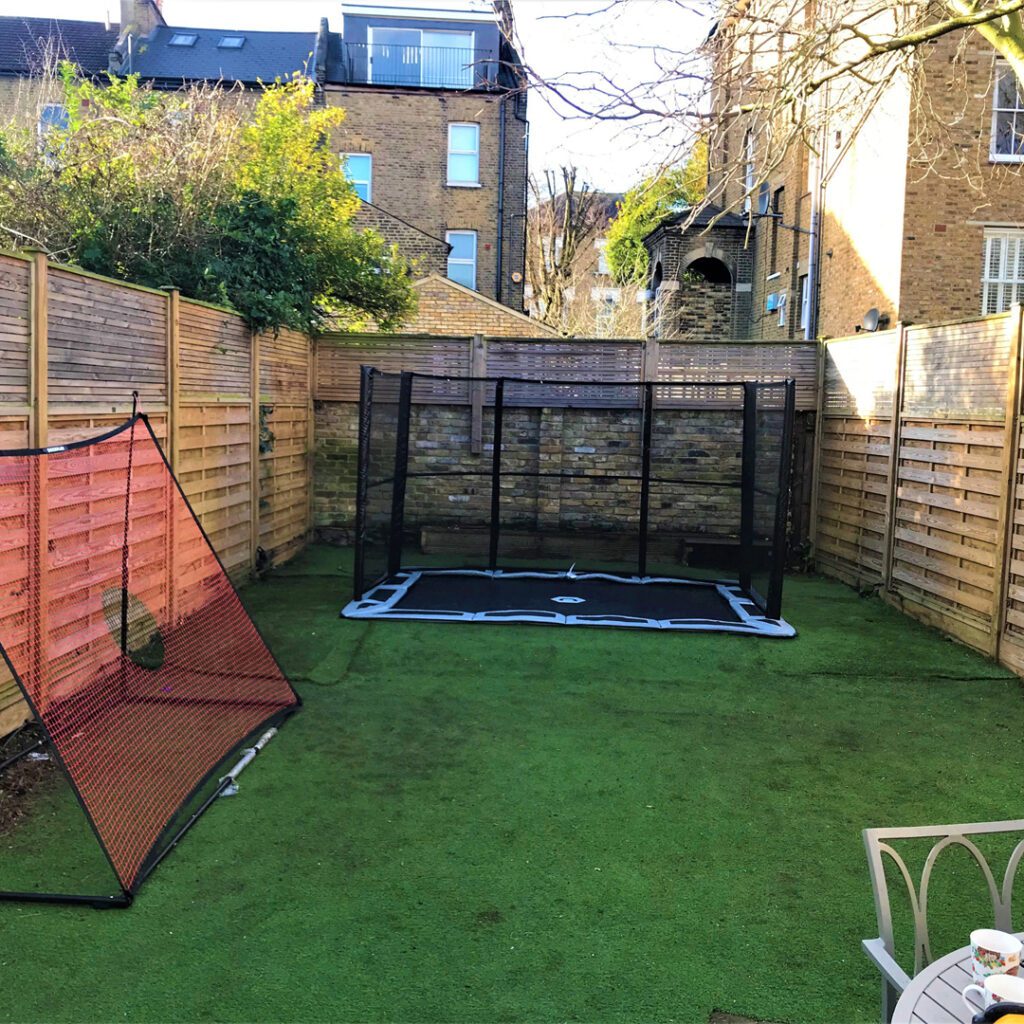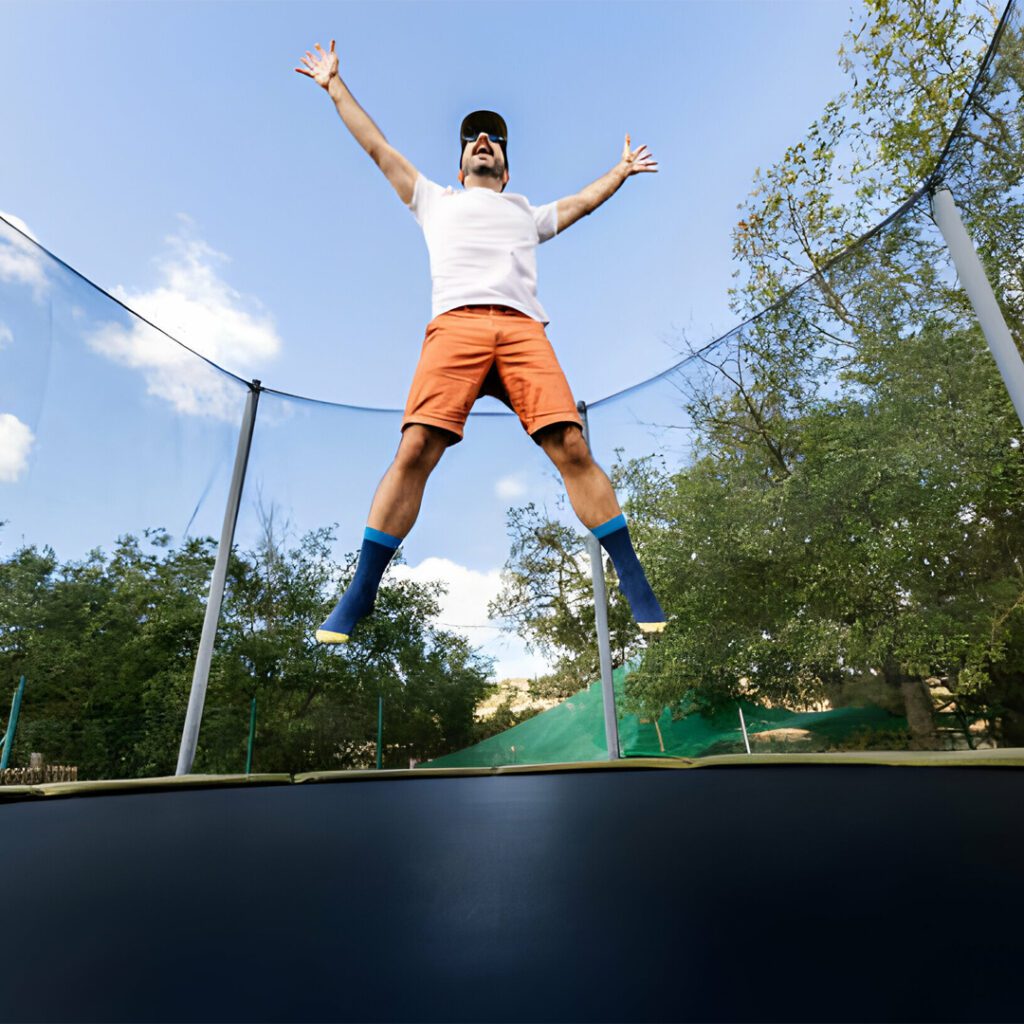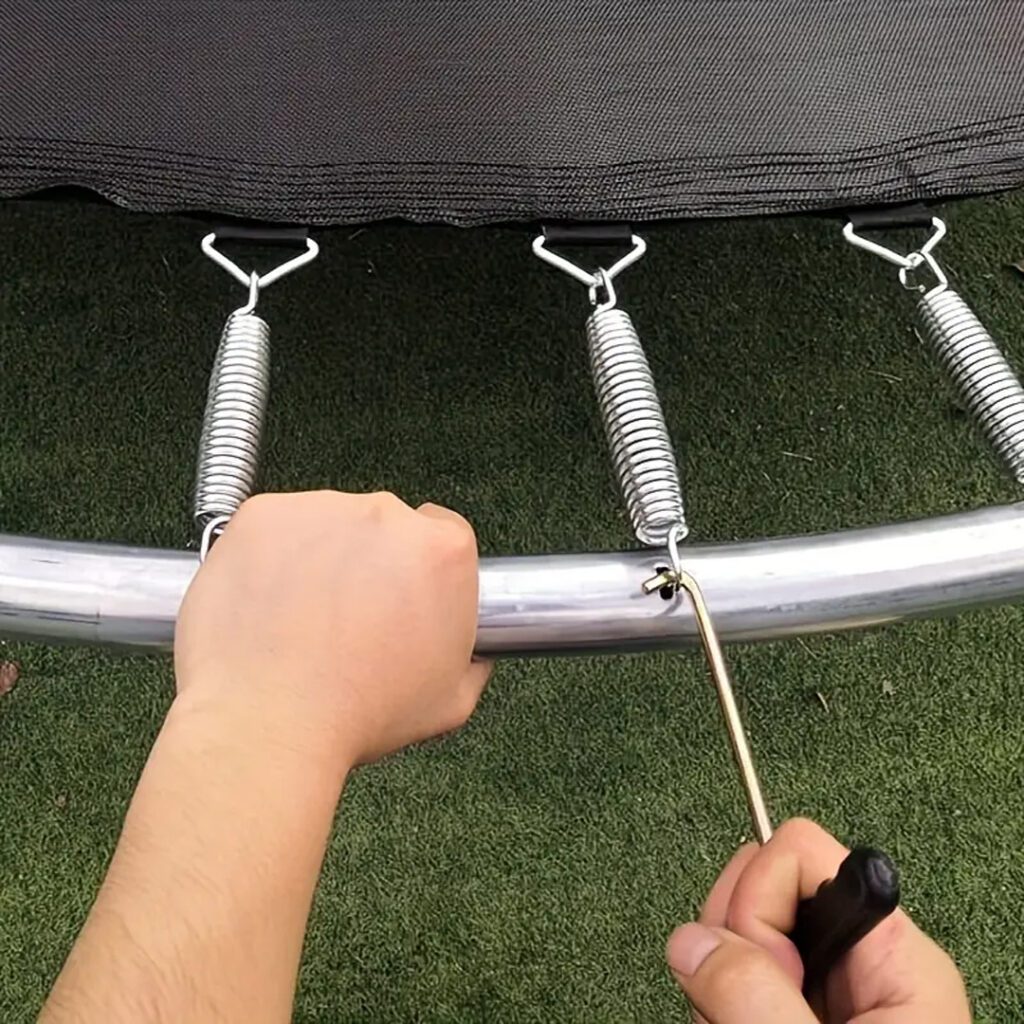
Looking for a fun and exciting way to keep your family active and entertained in your small garden? Look no further than a family trampoline!
Family trampoline is the perfect solution for small gardens, providing hours of fun for children and adults alike. With their compact design, they can fit into even the tightest of spaces, making them ideal for urban homes or smaller outdoor areas.
In this blog, we will discuss Why family trampoline is a perfect choice for your small garden
Benefits of having a trampoline in a small garden

Jumping on a trampoline isn’t just fun – it’s like doing a lively exercise that makes your heart and muscles stronger. Bouncing around not only burns calories but also helps you stay fit and flexible. Let’s see some more benefits:
1. Health and Fitness Benefits
Bouncing on a trampoline is not only a fun activity but also a fantastic cardio workout. It helps to improve cardiovascular health, increase flexibility and overall muscle strength. The repetitive bouncing motion engages the entire body, making it an effective way to burn calories and tone muscles. Additionally, trampolining improves balance, coordination, and proprioception, which are essential for overall fitness and wellbeing.
2. Family Bonding and Fun
A family trampoline provides a great opportunity for quality time and bonding with your loved ones. The shared experience creates lasting memories and strengthens family relationships. The joy and laughter that come from bouncing can instantly uplift everyone’s mood.
3. Stress Relief and Mental Wellbeing
Jumping on a trampoline releases endorphins, the feel-good hormones that promote relaxation and reduce stress. It’s a great way to relax after a long day and let go of any tension or worries. Trampolining can be a form of active meditation, allowing you to focus on the present moment and let go of any distractions.
Factors to consider when choosing a trampoline for a small garden
When selecting a trampoline for your small garden, there are several factors to consider to ensure you make the right choice.
1. Size and Shape
Innovative garden designs are currently in trend in the UK. Before you take any decision, measure the available space in your small garden to determine the maximum size and shape of the trampoline that will fit comfortably. A 14ft trampoline is the most common and versatile option for small gardens, as they provide equal bouncing performance across the surface. However, if you have an irregularly shaped garden, you might consider rectangular or oval trampolines, which can utilise the available space more efficiently.
2. Weight Limit and Safety Features
Check the weight limit of the trampoline to ensure it can safely accommodate all family members who will be using it. Additionally, look for safety features such as enclosure nets, padded frames, and spring covers. These features will help prevent injuries and provide peace of mind while your family enjoys their trampoline.
3. Durability and Quality
Invest in a trampoline that is made from high-quality materials and built to last. Look for strong frames, rust-resistant springs, and durable mats. Trampolines with UV-resistant and weatherproof coatings will withstand the elements and maintain their appearance and performance over time.
Safety considerations for trampolines in small gardens
Safety should always be a top priority when using a trampoline, especially in a small garden where space may be limited. Here are some essential family trampoline safety considerations:
1. Clear the Surrounding Area
Remove any obstacles or hazards from the area surrounding the trampoline, including sharp objects, furniture, and low-hanging branches. Make sure there is a clear space of at least two metres around the trampoline to prevent collisions with nearby structures.
2. Proper Installation and Anchoring
Follow the manufacturer’s instructions for proper trampoline installation and anchoring. Ensure that the trampoline is securely anchored to the ground to prevent it from tipping over or moving during use. This is particularly important in areas with high winds or inclement weather.
3. Adult Supervision
Always supervise children when they are using the trampoline, regardless of their age or experience. Adults should be present to ensure safe bouncing practices, monitor for any potential hazards, and provide assistance if needed.
Space-saving trampoline designs for small gardens

Trampolines come in various designs that are specifically tailored for small gardens. These space-saving designs allow you to maximise the available space while still providing an enjoyable bouncing experience.
1. Mini Trampolines
Mini trampolines, also known as rebounders, are compact and portable trampolines that are perfect for small gardens. They are typically smaller in size and can be easily stored or moved when not in use. Mini trampolines provide a low-impact workout and are suitable for both children and adults.
2. In-ground Trampolines
In-ground trampolines are designed to be installed at ground level, creating a seamless and aesthetically pleasing look in your small garden. By partially or fully burying the trampoline, it blends into the surroundings and minimises the visual impact. In-ground trampolines also provide easier access and reduce the risk of falling from a height.
3. Corner Trampolines
Corner trampolines are specifically designed to fit into corners and utilise the often-unused space in small gardens. By utilising the corners, you can make the most of the available area while still providing ample bouncing space. Corner trampolines come in various shapes and sizes to suit different garden layouts.
Tips for maximising the use of a trampoline in a small garden
To make the most of your trampoline in a small garden, here are some tips and ideas to consider:
1. Establish Safety Rules
Set clear safety rules and guidelines for using the trampoline to ensure everyone’s well-being. Teach your family members about safe jumping tricks, and taking turns if multiple people are using the trampoline simultaneously.
2. Incorporate Other Activities
Aside from bouncing, trampolines can be used for a variety of other activities and games. Consider setting up a basketball hoop or volley and play games of trampoline basketball or trampoline volleyball. You can also use the trampoline as a platform for yoga or stretching exercises.
3. Create a Comfortable Seating Area
If space allows, set up a seating area near the trampoline where family members can relax and watch others bounce. This allows for social interaction and encourages participation even for those who may not want to bounce.
Setting up and maintaining a trampoline in a small garden

Proper setup and maintenance are essential for the longevity and safety of your trampoline. Here are some guidelines to follow:
1. Follow the Manufacturer’s Instructions
Carefully read and follow the manufacturer’s instructions for setting up your trampoline. This includes assembling the frame, attaching the mat, and installing the safety enclosure. Following the instructions ensures that the trampoline is set up correctly and safely.
2. Weather-Resistant Cover:
Utilise a weather-resistant cover when the trampoline is not in use. This protective layer shields the equipment from rain and UV rays, preventing deterioration. Choose a cover specifically designed for trampolines and secure it properly to withstand windy conditions.
3. Debris Clearance:
Keep the surrounding area clear of debris, especially in autumn when leaves are abundant. Regularly remove any fallen branches, leaves, or other debris around the trampoline. This not only maintains a tidy garden but also prevents potential hazards during use.
4. Secure Anchoring:
Confirm that the trampoline is securely anchored to the ground, using appropriate anchoring kits. This is vital to withstand the gusty winds often experienced in the UK. Periodically check the anchor points to ensure they remain secure over time.
5. Establish Ground Rules:
Set clear guidelines for trampoline usage, especially if multiple users are involved. Encourage responsible jumping behavior and limit the number of users to prevent accidents. Establishing and enforcing ground rules contribute to a safe and enjoyable trampoline experience in your small UK garden.
Conclusion
Investing in a family trampoline is a fantastic decision that will bring joy, laughter, and fitness to your small garden. With their compact design and numerous health benefits, family trampolines are the ideal solution for small gardens. Safety features ensure that your loved ones are protected while enjoying hours of bouncing fun.
Remember to always prioritise safety, choose the right trampoline for your space, and follow maintenance guidelines to ensure years of enjoyment. Whether it’s bonding with your family, improving fitness, or simply having fun, a family trampoline is a valuable addition to any small garden. So go ahead, bounce away and create wonderful memories that will last a lifetime!





